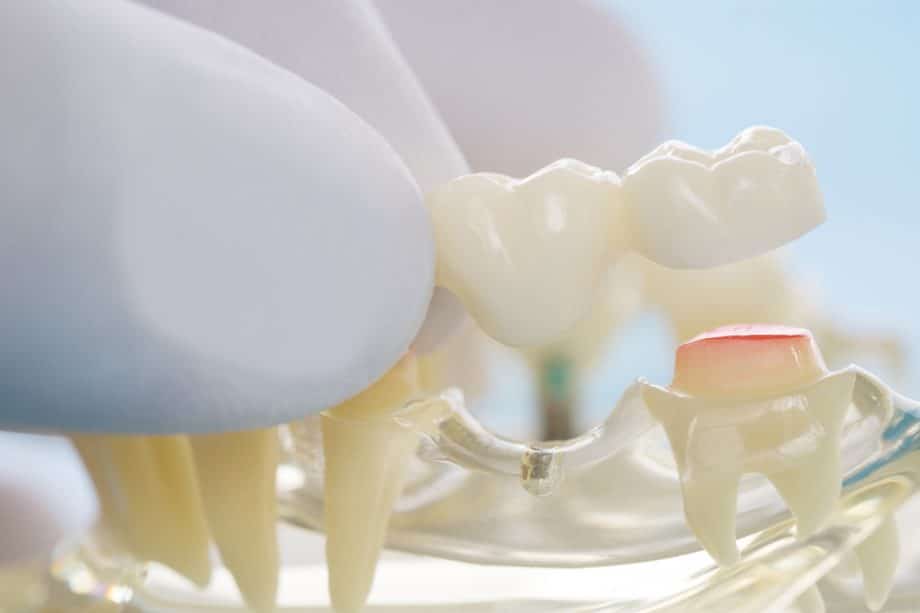As part of your evaluation of tooth replacement options, it is vital to carefully consider the longevity and integrity of dental bridges.
Their lifespan depends on various key elements- such as material use, construction techniques, and daily oral hygiene routines can all have an effect on expected longevity estimates.
Factors Affecting the Lifespan of Dental Bridges
Longevity in dental bridges depends on a number of critical elements. Construction types such as cantilever bridges can have an enormous effect, typically lasting 5-10 years and conventional bridges 10-15. Materials used, like porcelain fused to metal or all-ceramic, also play an essential part.
Maintaining good oral hygiene is integral to the success of a bridge. Brushing and flossing regularly is critical in minimizing decay and avoiding potential complications; regular dental visits allow early detection of issues before they threaten the integrity of your bridge.
At its core, dental bridges depend on both dentist and patient expertise in design, preparation, and placement to be successful long-term investments.
Average Lifespan of Dental Bridges
Given all of the factors impacting dental bridge longevity, reported lifespans can range anywhere from 5 to 15 years with proper oral hygiene practices, high-quality construction techniques, and ongoing dental care plans being followed up on regularly; some bridges may even outlive this estimate!
Realistically assessing individual experiences is key. Dental examinations help monitor your bridge over time, which allows early detection of issues before they compromise its lifespan. Though proper care and maintenance may extend its life, regular assessments by your dentist are key in order to maximize durability. A well-made bridge and proper oral care should help your bridge last many years without incident, but be sure to visit regularly so you know your bridge is aging well.
Types of Dental Bridges
Dental bridges come in different types to match individual needs and situations.
- Traditional bridges use adjacent teeth for support and are commonly used to replace one or more missing teeth.
- Cantilever bridges attach to teeth on only one side when support on both sides isn't possible.
- Maryland bonded bridges use a frame for prosthetic teeth bonded to surrounding teeth.
- Implant-supported bridges attach to dental implants fused within the jawbone for greater stability.
With various options available, selecting the right bridge type involves assessing oral health status, tooth loss extent, and personal preferences. Discussing your specific case with a dentist clarifies which bridge variety offers the optimal restorative solution for you. The key is choosing the design tailored to your dental requirements and goals.
Dental Bridges in Rapid City
The specific bridge type, quality of construction, patient oral hygiene, and regular dental visits all play a role in the longevity of dental bridges.
By understanding the influencing factors and taking proactive measures, you can feel confident in choosing a bridge designed for your needs and oral health goals. With the right information and preventive care, your bridge can remain functional for extended use as part of your healthy, restored smile. To learn more or to schedule an appointment, contact us at 605-343-9352.
Frequently Asked Questions
How is a dental bridge placed?
Getting a dental bridge is usually a two-appointment process. During the first appointment, the abutment teeth are prepared by reshaping them to securely hold the crowns that will anchor the bridge. Impressions are taken of your teeth to create the bridge. A temporary bridge is usually placed to help protect the teeth while the permanent bridge is being made. At the second appointment, the temporary bridge is removed, and the permanent bridge is checked for fit and cementation. Your dentist will make any necessary adjustments to ensure proper bite and comfort.
Do I need a dental implant, or can a bridge replace a missing tooth?
Not everyone is a candidate for implants due to things like bone loss in the area of the missing tooth. Bridges can fill the space left by a missing tooth without extensive surgery. Your dentist will evaluate if you have adequate bone support and healthy abutment teeth to properly place a bridge. If an implant is not feasible, a bridge may be the next best option to replace your missing tooth.

